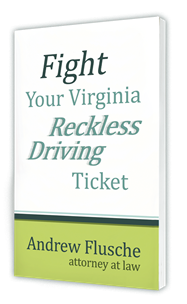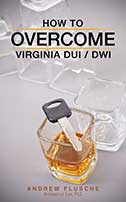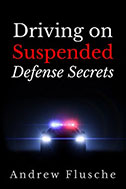Spotsylvania Passes Vague Full Time and Attention Law
On September 13, 2016, the Spotsylvania County Board of Supervisors passed a broad, vague ordinance that prohibits operating a motor vehicle while not giving full time and attention to the operation of the vehicle.
On its face, this seems like an innocent ordinance. It was recommended by the Sheriff’s Office and Commonwealth’s Attorney in order to respond to “minor” traffic accidents. They claim that the new ordinance gives deputies an option to write tickets that are less than reckless driving when people have a minor vehicle crash.
However, in my opinion, there are major problems with the way the ordinance was proposed and how it might be enforced (similar to the issues I pointed out in 2013 with Stafford’s ordinance). I submitted comments about the ordinance to the Board of Supervisors and spoke at the public hearing against the ordinance as written. I was also interviewed on the radio about it.
In a nutshell, this ordinance is vague and unnecessary. It’s an overbroad law that doesn’t properly target the alleged issue (minor traffic accidents). I am concerned this ordinance could be used against citizens in unforeseen ways.
Here are the main problems that I highlighted to the Board:
1. The ordinance is vague. With any traffic or criminal law, we should ask, “How far can this be stretched?” The Commonwealth’s Attorney is cited in the newspaper as saying that the ordinance could apply to people who are not involved in accidents, but he says that is not the point of the ordinance. Thus, we have a proposed law that is too broad for its intended purpose. It could apply in unforeseen ways, such as a driver adjusting their A/C without endangering anyone.
On the opposite end of the spectrum, the ordinance does not actually apply in many minor traffic accidents. Deputies typically write a reckless driving ticket when a vehicle slips off the edge of a narrow county road and ends up in the ditch without hitting anyone. It’s a minor accident by any account. But unless there is evidence that the defendant was distracted or looked away, the ordinance would not apply.
At a minimum, the ordinance could be tightened up by requiring an actual vehicle collision for the law to apply.
2. Have any members of the local defense bar been consulted about the ordinance? The ordinance comes at the request of the Commonwealth’s Attorney and Sheriff. There are two sides to every issue, especially when discussing crimes and traffic offenses. The Board should have a dialogue with the defense bar to make sure all sides of this issue are considered.
3. The Agenda Summary shows a bias against defendants. Defendants are innocent until proven guilty. Defendants should be referred to as “defendants” or “the accused.” However, the Agenda Summary refers to innocent people as “Offenders.” It presumes that people have in fact committed an offense. Nobody is an “offender” unless they are found guilty of an offense.
4. Sometimes nobody is guilty. The Virginia Supreme Court is clear that traffic accidents do happen, and it doesn’t always mean that someone is guilty of an offense. If a deputy writes a reckless driving ticket, and the defendant appears in court, the judge may end up hearing the evidence and finding the defendant not guilty. If deputies write a minor ticket and encourage pre-payment, the defendant might simply plead guilty to avoid the inconvenience of court, even if they are not guilty.
As I sat in court editing this, TWO separate defendants appeared for single vehicle reckless driving accidents from a Virginia State Trooper. They pleaded not guilty without a lawyer. The judge heard the evidence (which consisted of the drivers swerving to miss an animal, then going off the road). The judge found both defendants NOT guilty. If they had been given a pre-payable ticket, they might have pleaded guilty to avoid coming to court, even though they did nothing wrong.
5. Pre-paying could hurt defendants civilly. If a driver has a minor accident and gets a “distracted driving” ticket that they are encouraged to pre-pay, that guilty plea can be used against them if another party later files a civil lawsuit. Some defendants might choose the easy, no points on license option of prepaying without thinking about the bigger ramifications at issue.
6. The ordinance will likely NOT save the County money. Deputies have regular dates where they have to appear in court for their tickets. Most of the deputies who respond to traffic accidents have MANY cases on each of their dockets. Converting a traffic accident or two to a pre-payable offense would NOT normally keep these officers from having to come to court. They will usually be at court for other matters ranging from speeding tickets to DWIs to serious felonies.
7. Fines already go to the County when deputies write tickets. The Agenda Financial Impact notes that “Due to this offense being a County Ordinance, the fines collected are kept by the County.” That’s already the case. When deputies write a ticket for a state law violation, they precede the code section on the ticket with “12-2”, which refers to the County Code section that incorporates the state motor vehicle laws into the County Code. Thus, when a deputy writes a speeding ticket or reckless driving ticket, any resulting fines already go to the County.
But what percentage of traffic accidents does the Sheriff’s Office respond to, compared to the State Police? Since the proposed ordinance is a County Code violation, it would not apply to State Police accident investigations; the State Police cannot write tickets for County Code violations. The State Police actually handle many of the accident investigations within the County, and fine money from their tickets goes the Virginia Literary Fund.
8. The ordinance might add MORE to the court docket. When a defendant receives a pre-payable ticket that does not require a court appearance (such as “following too closely”), the Spotsylvania General District Court does not subpoena witnesses for the first calling of the case. The deputy shows up on his scheduled court date. The case gets called (if it has not been prepaid). If the defendant appears and wants a trial, the judge continues the case to the deputy’s next scheduled court date. The witnesses are subpoenaed for that new date. Everyone shows up on the second date, and the trial is held. There is a paperwork process where the defendant can request trial in advance; however, many pro se defendants do not seem to understand and follow this process. Contrast this with many reckless driving cases (where the defendant is supposed to appear): the witnesses are usually subpoenaed for the first calling of the case, where the case can typically be disposed of with everyone present on the first court date.
If you got a ticket for failure to pay full time and attention in Spotsylvania, call me to analyze it with you.




